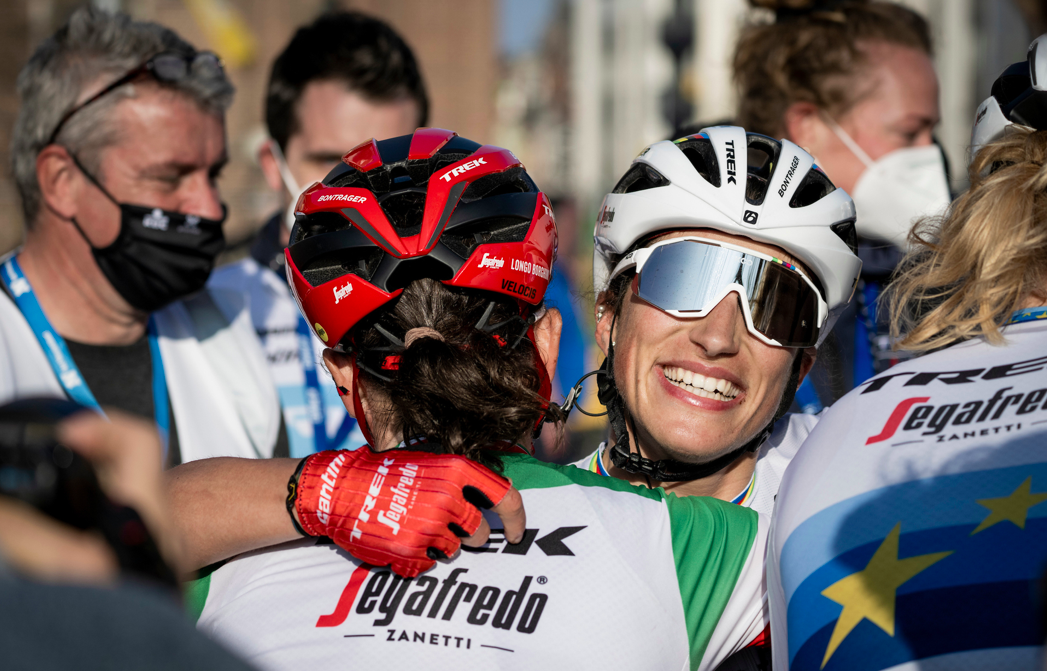“Thank you! Thank you! Thank you so much!” she said with genuine gratitude, humility and joy.
But should she have?
Italian Elisa Balsamo had just crossed the line first in the Ghent-Wevelgem road race. It’s one of pro cycling‘s most prestigious races in the Belgian spring classics part of the season. In a total hot streak, this was the 3rd race she’d won in 7 days! And in the race before that she’d come 2nd! On fire.
In what was probably the second of 4 languages European pro cyclists tend to speak, the current world champion was celebrating just past the finish line with her teammates. They’d come in just a little later, having done the work during the rest of the race and in the final 20km to set up the 200m sprint that is Elisa’s specialty.
Road Cycling is a Tactical Team Sport
They ride individually on their own bikes and only one rider is formally recognised for each of the three positions on the podium, but every rider racing for a team has a specific role and function. These roles can vary with each race as competitors, conditions, and terrains vary. Roles can also change during the race – unexpected race events, crashes, riders feeling weak or unwell etc etc They’re all individual parts of the same organism.
And this applies more than ever before as the performance capabilities across teams are becoming increasingly even.
Factors that before were nice ideas but not always critical, are now more often the difference.
And that’s why as soon I heard Elisa say this, I instantly reacted.
Who's win was it?
“Thank-you” in our culture tends to mean that someone has given you something, done something for you, or made something possible, and you want to recognise them and show your appreciation.
So was she saying “Thank you for doing all that work in the race that helped me win? Or “Thanks for giving me this win?”
Or something else?
Because for mine, her team mates weren’t helping “her” win. They were contributing to the “team” winning. And they were contributing to their “own” win. This is the essence of where the term “ownership” comes from. Elisa’s role was to be in the right position if it occurred, to sprint for the win. The bullet that gets shot out of the gun, so to speak.
So was she meaning thank you for helping me have this victory?
And if so, this is subtly dangerous territory. An almost invisible cultural glue.
Qualifier
Word Power
But for the purpose of a learning exercise, let’s choose to go with this interpretation and distill learning from it.
This example really highlights the human domain of language.
Humans use language not only to describe the world that is, but also to create a world that can be. The subtle language we use in our most unconscious, unguarded moments, can point to deeper truth of what we really believe, have a huge effect on how we see future possibilities, and is the basis of cultures that are developed and maintained, for better or worse.
Sometimes language can be rooted in previous times or less mature distinctions, but still be in use regardless. And in a sporting context, language (and the associated meaning and behaviour) can be some of the things that restrict team spirit and trust. Where the talk is not walked.
How cruel a twist would it be, that in expressing our appreciation, we might be consolidating resistance to true team culture and human trust.
And that, within the world of performance, would be a tragedy.
You gotta whatcha words.
“Word.”
Reckon language might be limiting you or your team? Or even more so, absolutely no idea about language in your culture? Get in contact and we’ll make a time to have an obligation-free chat.

